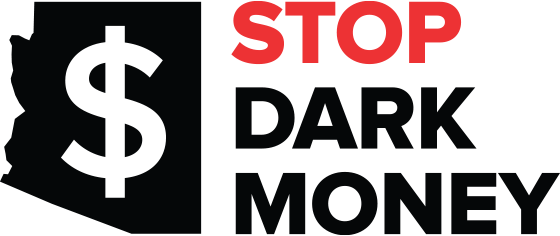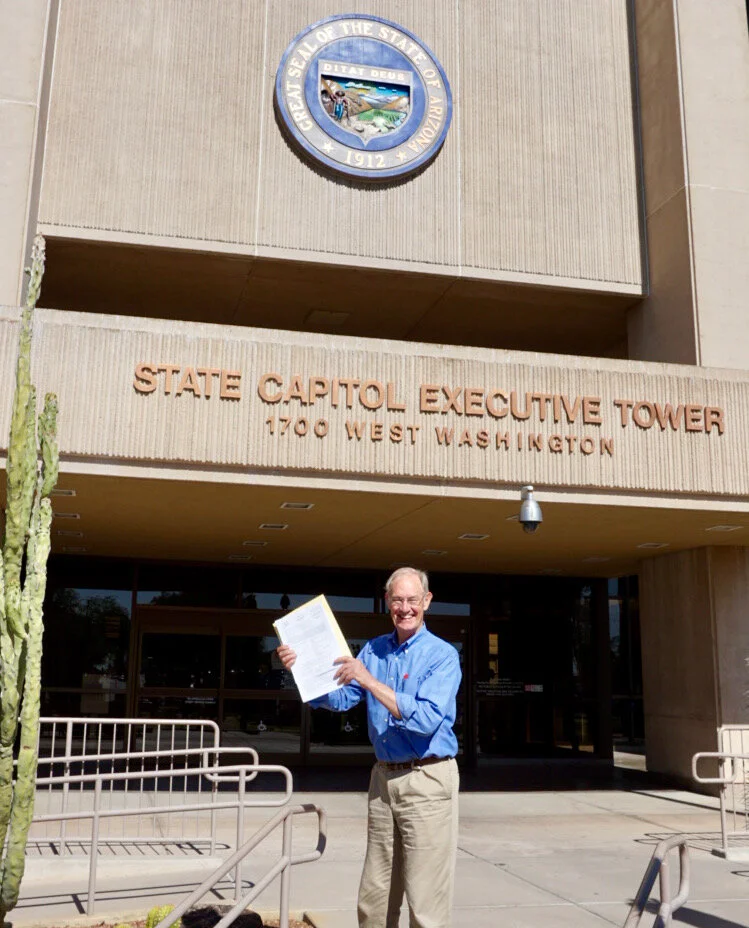FOR IMMEDIATE RELEASE
Contact: Pat Barrett, (480) 937-8835, or Terry Goddard, (602) 258-5521
STOP DARK MONEY BALLOT INITIATIVE FILED
Former Attorney General Terry Goddard Launches 2022 Effort to Finally Shine Light on Anonymous Political Contributions
PHOENIX – Voter’s Right to Know, a campaign working to ban dark money, filed a ballot initiative with the Secretary of State’s office today. Former Attorney General Terry Goddard is co-chairing this ballot initiative to require disclosure of anonymous political contributions of more than $5,000 to influence the outcome of an election.
“Arizona voters should have the right to know who is spending money to influence our elections,” stated Terry Goddard. “For too long people we don’t know have been spending money to influence our elections and pass laws we don’t like. This initiative will put a stop to that. People have a right to advocate for the candidates and the issues they care about, but the voters must also have the right to know who is influencing our elections. Survey after survey, and election after election have shown that voters agree with us.”
Voters in the City of Tempe and City of Phoenix have both passed similar disclosure measures at the city level with over 85% support at the ballot box. A statewide survey conducted by HighGround showed over 92% of voters would support this measure to ban dark money spending in Arizona elections. The initiative receives high levels of support across all age, partisan, and regional demographics.
A similar anti-dark money ballot measure was on track to qualify for the 2020 election, but the coronavirus forced the campaign to suspend operations. The campaign found it nearly impossible to maintain early social distancing recommendations while circulating petitions, so the decision to suspend operations was made out of an abundance of caution to keep volunteers safe and protect the general public. This 2020 effort had already collected over 280,000 signatures by early March 2020.
The Voter’s Right to Know initiative is a refined version of the previous “Outlaw Dirty Money” campaign. The committee filed the measure as a legislative initiative which will require fewer signatures than the constitutional amendment Outlaw Dirty Money pursued in 2020. A legislative initiative requires 118,000 less signatures to qualify for the ballot. This will increase the likelihood of this measure appearing on the 2022 ballot.
The committee nicknamed this effort “Stop Dark Money,” a name that has attracted strong support. Nearly two thousand volunteers circulated petitions in the past and many have expressed interest in the new measure. Non-traditional campaign donors are stepping up to pledge the funds necessary to get this measure on the ballot.
“Removing dark money attack ads from the political process is an investment in Arizona’s future,” stated David Tedesco, local entrepreneur and campaign co-chair. “I believe improving the political discourse will encourage better candidates to run for office and we will see better policy as a result. I am proud to give financial resources to help Stop Dark Money get on the ballot and let voters decide the fate of dark money in Arizona.”
Chuck Coughlin, President of HighGround, Inc an Arizona Public Affairs firm and a long-time supporter of similar reform initiatives said, “It is time that Arizona voters be granted the right to know who is financing their elections. I am proud to be a supporter of this initiative. Count me in as a contributor and a supporter. We are going to finally get this done for Arizona.”
The Voter’s Right to Know committee has until July 8, 2022 to file necessary petition signatures to be placed on the November 2022 ballot. More information about the initiative can be found at StopDarkMoney.com. Volunteers can request a petition by calling (602) 633-5146 or contacting info@stopdarkmoney.com.
About the Initiative
Voters Right to Know – “Stop Dark Money” - establishes that:
Arizona voters have a right to know who is spending to influence their elections
Organizations spending more than $50,000 in state races or $25,000 in local races for campaign media must report the original source of their funding.
Organizations meeting this threshold must disclose all original contributors who gave more than $5,000 in an election cycle.
Original source is defined as the person or company that earned the money, thereby stopping the existing practice of creating a maze of organizations to hide the original source.
The Citizens Clean Election Commission, a popular and effective regulatory body, is empowered to write and enforce the regulations to implement the Voter’s Right to Know Act and to enforce its provisions.
Voters who suspect a violation of the disclosure rules will be able to file a complaint directly with the Clean Elections Commission.
Local governments can pass more stringent requirements than those set forth in the Voter’s Right to Know Act.
###

